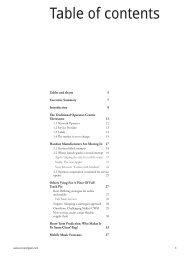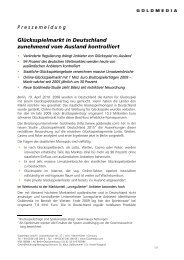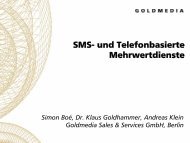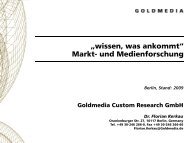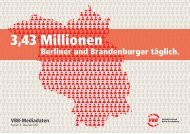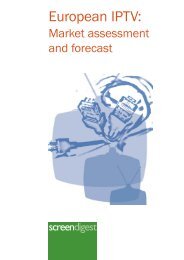P ress R elease Media trends 2010 - Goldmedia
P ress R elease Media trends 2010 - Goldmedia
P ress R elease Media trends 2010 - Goldmedia
You also want an ePaper? Increase the reach of your titles
YUMPU automatically turns print PDFs into web optimized ePapers that Google loves.
P r e s s R e l e a s e<br />
<strong>Media</strong> <strong>trends</strong> <strong>2010</strong><br />
Berlin, 12th January <strong>2010</strong>. The economic and advertisement crises left a deep<br />
impact on media and telecommunications markets in 2009, driving the search for<br />
new and lucrative business models forward. Which changes and challenges will<br />
arise in <strong>2010</strong>? The experts at <strong>Goldmedia</strong> have compiled brief analyses on <strong>trends</strong><br />
in television, internet, mobile communications, publishing, and media research in<br />
Germany. (http://www.goldmedia.com)<br />
� HDTV will gain appeal for the mass market, propelling the TV<br />
digitisation process forward<br />
� Content overload will make navigation systems more important<br />
– and the market ripe for EPGs<br />
� Will scripted reality shows be the big hits for TV <strong>2010</strong>?<br />
� “Freemium” everywhere – a change of direction for marketing<br />
of digital content?!<br />
� Social media will become a standard part of media planning<br />
� Pocket newspapers? eReader becomes a must for publishers<br />
� Hope for mobile market: mobile data services will help<br />
compensate for sales declines<br />
� Market and media research: changes in consumer behaviour<br />
demand new analysis systems<br />
<strong>Goldmedia</strong> GmbH | Oranienburger Str. 27 | 10117 Berlin-Mitte | Germany<br />
Tel. +49-(0)30-246 266-0 | Fax: +49-(0)30-246 266-66 | www.<strong>Goldmedia</strong>.com<br />
HRB: 88984 | AG Berlin-Charlottenburg| USt.ID: DE 813765996<br />
Geschäftsführung/Managing Directors: Dr. Klaus Goldhammer | Dr. André Wiegand<br />
1/8
TV <strong>2010</strong><br />
HDTV will gain appeal for the mass market, propelling the<br />
digitisation process forward<br />
In <strong>2010</strong>, HDTV will make significant gains in the mass market. High-definition<br />
TVs are already almost everywhere – there were about 19 million HD-capable<br />
devices in German households by the end of 2009. But HD content isn’t yet<br />
simple to access: it is available primarily on Blu-rays (which are increasingly<br />
turning into take-home items), as an add-on package with Sky (very expensive,<br />
since it’s not sold singly), and via IPTV (but far from offered by all IPTV providers).<br />
This situation will have to change in <strong>2010</strong>.<br />
After several start-up attempts, including the HD trial during the 2009 IAAF<br />
World Championships, the Olympic Winter Games <strong>2010</strong> are set to mark the<br />
launch of regular HDTV service from ARD and ZDF, making it the new standard<br />
for television. The service not only brings better picture quality to more viewers,<br />
but will also serve as an impulse for digitisation, especially in cable, which<br />
remains predominantly analogue. The first signs are present: starting in<br />
December 2009, Kabel BW has given all new digital customers HD receivers as<br />
standard.<br />
Adopting RTL and ProSiebenSat.1’s encryption strategies, HDTV has been sold to<br />
viewers on the HD+ satellite platform as a premium service since the end of<br />
2009. In the process, HDTV could give pay TV a badly-needed push. If not HDTV,<br />
what else will generate willingness to pay among German customers beyond for<br />
the Bundesliga, Germany’s national soccer league?<br />
New opportunities will be capitalised on in <strong>2010</strong>, and HDTV will be marketed<br />
with the aim of quickly and effectively making HD digital TV available to a large<br />
audience. The industry should not repeat the mistake of the music and film<br />
industries with user-unfriendly restrictions to recording and time shifting. In<br />
<strong>2010</strong>, Germany could finally free itself of its label as one of Europe’s straggling<br />
television markets.<br />
(Mathias Birkel, Consultant <strong>Goldmedia</strong> GmbH <strong>Media</strong> Consulting & Research)<br />
Content overload will make navigation systems more important –<br />
and the market ripe for EPGs<br />
Just like Google made the internet searchable and, consequently, usable,<br />
intelligent search engines are needed to guide future users through the jungle of<br />
audiovisual media. In a TV landscape with more than 2,500 channels and over 50<br />
video-on-demand services, German TV viewers can no longer look through<br />
everything offered. Adding to the selection are catch-up TV services as well as<br />
shows and films that can be viewed after broadcast through time shifting. The<br />
selection will only increase in <strong>2010</strong>.<br />
In addition to online catch-up- offers, catch-up content on the television will also<br />
grow in popularity. IPTV provider Alice offers its customers ARD’s daily show on<br />
demand. Catch-up TV will also become available on other TV platforms. Kabel<br />
Deutschland and Kabel BW have announced the launches of their video-ondemand<br />
services for <strong>2010</strong>. On top of that, hybrid TV allows viewers to watch<br />
<strong>Goldmedia</strong> GmbH | Oranienburger Str. 27 | 10117 Berlin-Mitte | Germany<br />
Tel. +49-(0)30-246 266-0 | Fax: +49-(0)30-246 266-66 | www.<strong>Goldmedia</strong>.com<br />
HRB: 88984 | AG Berlin-Charlottenburg| USt.ID: DE 813765996<br />
Geschäftsführung/Managing Directors: Dr. Klaus Goldhammer | Dr. André Wiegand<br />
2/8
online content like internet TV, footage from video platforms like YouTube, and<br />
films saved on the home computer on the television.<br />
A lucrative market will arise for electronic programme guides (EPGs), which have<br />
been given little attention to date. The EPG is now more than a digital<br />
programme guide and is on its way to becoming an all-inclusive entertainment<br />
guide. Whether on the television, in the internet, or with a cell phone, the EPG of<br />
the future locates content from both TV and internet that is of interest for users<br />
and offers an automatic recommendation system in the form of personal TV<br />
channels or personalised programme tips. Programme recommendations from<br />
friends or users with similar interests on sites like Twitter and Facebook will also<br />
be displayed in the EPG of the future. The EPG is gaining importance and<br />
potential among market players as a transaction and advertisement platform.<br />
In Germany, it has mainly been the IPTV providers offering comprehensive EPGs,<br />
which are capable of more than just a display of TV programmes. New EPGs are<br />
expected for <strong>2010</strong>, especially in the cable segment. The introduction of HD+ on<br />
satellite has created a stimulus for further EPG development.<br />
At the end of 2008, only 13 percent of German TV households were equipped<br />
with EPGs. <strong>Goldmedia</strong> forecasts that this value will rise to 59 percent by 2014.<br />
There are currently over 30 online EPGs in Germany. This number confirms that a<br />
strong need for navigation support is already present. Now it is up to market<br />
players to bring entertainment guides to the television as well.<br />
(Marcel Piopiunik, Consultant <strong>Goldmedia</strong> GmbH <strong>Media</strong> Consulting & Research)<br />
Will scripted reality shows be the big hits for TV <strong>2010</strong>?<br />
Major TV programme innovations are not expected for <strong>2010</strong> in Germany. The ad<br />
crisis isn’t over yet, sharply curbing willingness to take risks. Also, viewers are<br />
looking for familiarity. This makes it difficult for new types of programmes to win<br />
over the public. This was Sat. 1’s particularly painful experience in 2009.<br />
The current success of the RTL afternoon programme will influence <strong>2010</strong>’s<br />
television programmes. The station is drawing in phenomenal ratings with its<br />
scripted reality television shows. In these fake reality shows, everything is even<br />
more dramatic than in the life-help entertainment formats (like Super Nanny) of<br />
recent years: the protagonists are even more indebted, even more naive, and in<br />
even worse circumstances. The mechanism of “social downward comparison”<br />
explains the success of these programmes. Viewers feel good while watching the<br />
shows because they see that others are doing much worse than they. But what’s<br />
good for the afternoon ratings could have a negative influence on primetime.<br />
The families that are helped by Supper Nanny and debt counsellor Peter Zwegat<br />
are suddenly not in bad enough shape. The shows could lose market share.<br />
How does the competition react? ProSieben will certainly try to profit from the<br />
scripted reality trend in <strong>2010</strong>, testing out new, scripted shows in their afternoon<br />
programme. Sat.1 is refining the station’s brand and seems disinterested in<br />
following the trend further for the time being. Its legal TV series, Lenßen &<br />
Partner, was just suspended. It’s much more likely that Sat 1. will try out a genre<br />
that is the object of renewed discussion among programme makers: the good<br />
old game show.<br />
(Christoph Schwab, Consultant <strong>Goldmedia</strong> Custom Research GmbH)<br />
<strong>Goldmedia</strong> GmbH | Oranienburger Str. 27 | 10117 Berlin-Mitte | Germany<br />
Tel. +49-(0)30-246 266-0 | Fax: +49-(0)30-246 266-66 | www.<strong>Goldmedia</strong>.com<br />
HRB: 88984 | AG Berlin-Charlottenburg| USt.ID: DE 813765996<br />
Geschäftsführung/Managing Directors: Dr. Klaus Goldhammer | Dr. André Wiegand<br />
3/8
Internet <strong>2010</strong><br />
“Freemium” everywhere – a change of direction for marketing of<br />
digital content?!<br />
All content that can be made digital is available for free sooner or later. Chris<br />
Anderson focused on this business model “Freemium” in his book, “Free: Future<br />
of a Radical Price.” The paradigm for digital content of every kind has long been:<br />
“Offer the user a free basic product and hope that he or she will pay for<br />
additional premium services.”<br />
Along these lines, many media providers’ lack of success in searching for a true<br />
online business model will soon lead them to rethink the situation. Why should<br />
users pay for something that they can get for free with a few extra clicks? In<br />
<strong>2010</strong>, there should be a change of direction for the marketing of digital content<br />
– otherwise, the industry runs the risk of entrenching piracy among users as a<br />
matter of course. It might even be possible to make money from piracy, e.g.,<br />
through a fee-based service that allows easy access to (illegal) digital content, at<br />
the same time legalising the access. Even if users’ willingness to pay for the<br />
content itself continues to decrease, they may still be willing to pay for user<br />
friendliness and convenience.<br />
The freemium principle is also increasingly setting precedent outside the online<br />
world. A French telecommunications provider, appropriately named “Free”, has<br />
successively increased its offerings for years now (at a constant charge of 29.99<br />
euros). Started as an exclusively-online provider, Free integrated larger download<br />
bandwidths, voice over IP, and IPTV and, in doing so, steadily expanded the<br />
number of programmes included. One German company centered around this<br />
model is HanseNet, which charges no basic fee for TV via DSL. The TV connection<br />
is made a giveaway, serving as the basis for marketing premium content (pay TV<br />
or VOD). This signals that a growing number of providers from very different<br />
branches will try to get customers on board with free services, increasing their<br />
likelihood to sign up for premium services later.<br />
(Mathias Birkel, Consultant <strong>Goldmedia</strong> GmbH <strong>Media</strong> Consulting & Research)<br />
Social media will become a standard part of media planning<br />
The difficult economic situation is reflected in budget planning within the<br />
advertisement industry. But monetary bottlenecks aren’t by any means the only<br />
problem. Many hard-to-miss uncertainties about ad concepts also pose<br />
difficulties. The real challenge for <strong>2010</strong> lies in rethinking and restructuring media<br />
strategies and a more focused search for new target groups.<br />
The need to expand reach within the select core and additional target groups<br />
compels decision makers to select platforms and media more systematically,<br />
finding those in which the target groups are actually active. Planning criteria like<br />
“Sinus Milieus” are increasingly in the background and are enhanced or replaced<br />
by “soft factors”, such as content affinity.<br />
<strong>Goldmedia</strong> GmbH | Oranienburger Str. 27 | 10117 Berlin-Mitte | Germany<br />
Tel. +49-(0)30-246 266-0 | Fax: +49-(0)30-246 266-66 | www.<strong>Goldmedia</strong>.com<br />
HRB: 88984 | AG Berlin-Charlottenburg| USt.ID: DE 813765996<br />
Geschäftsführung/Managing Directors: Dr. Klaus Goldhammer | Dr. André Wiegand<br />
4/8
The escalating user levels in social media are transforming social media from a<br />
nice addition to an established part of media planning. Dialogue with media<br />
users and interaction with target groups are becoming more important to<br />
anyone who must deal with media planning. The still-conservative trend of<br />
investing a small percentage of the TV budget in social media marketing will (by<br />
necessity) continue to develop in <strong>2010</strong>.<br />
Social media marketing, or better social media interaction, is much more than<br />
the integration of Facebook and Twitter. It is the strategic, all-inclusive planning<br />
of blogs, forums, communities, and social networks. There are already more than<br />
2,500 relevant platforms in the German market alone, and the number is rising.<br />
The social media interface falls right between above and below-the-line<br />
advertising and planning must be just as structured, concrete, and precise as<br />
planning for traditional media. The sharpest attention should be given to<br />
strategic brand management. The internet doesn’t forget, meaning badly-placed<br />
or misleading advertisements can hurt a brand for years.<br />
(Simon Boé, Managing Director <strong>Goldmedia</strong> Sales & Services GmbH)<br />
<strong>Goldmedia</strong> GmbH | Oranienburger Str. 27 | 10117 Berlin-Mitte | Germany<br />
Tel. +49-(0)30-246 266-0 | Fax: +49-(0)30-246 266-66 | www.<strong>Goldmedia</strong>.com<br />
HRB: 88984 | AG Berlin-Charlottenburg| USt.ID: DE 813765996<br />
Geschäftsführung/Managing Directors: Dr. Klaus Goldhammer | Dr. André Wiegand<br />
5/8
Print media <strong>2010</strong><br />
Pocket newspapers? eReader becomes a must for publishers<br />
The eReaders presents publishers with a chance to use digitisation to gain new<br />
readers and establish payment and subscription models, saving substantial costs.<br />
Following the remarkable success of the Apple iPhone and the Amazon Kindle,<br />
electronic reading devices (eReaders) are becoming an attractive way for the<br />
consumer p<strong>ress</strong> to deliver their content to readers at a charge. German p<strong>ress</strong> like<br />
the Frankfurter Allgemeine Zeitung, Handelsblatt, and Wirtschaftswoche are<br />
already available at the Kindle Store. Spiegel and Stern have announced that their<br />
magazines will be offered on the iPhone starting in <strong>2010</strong>. And Axel Springer AG<br />
has offered an iPhone app at a charge since December 2009.<br />
Internationally, publishers are also scrambling to develop digital distribution<br />
concepts. In Switzerland, Swisscom has launched a pilot project in cooperation<br />
with the major publishing houses, offering an own eReader. Numerous US<br />
publishers want to create a digital kiosk for mobile reading devices.<br />
Publishers’ hopes aren’t without a basis. Newspapers on the eReader could<br />
dispense with the former printing and distribution expenses. This could lead to<br />
cost savings of up to 40 percent. Personalised news services and new revenue<br />
models can also be implemented on the eReader. This is a trend that newspaper<br />
publishers can’t afford to pass up in <strong>2010</strong>.<br />
(Dr. Klaus Goldhammer, Managing Director <strong>Goldmedia</strong> GmbH <strong>Media</strong> Consulting &<br />
Research)<br />
<strong>Goldmedia</strong> GmbH | Oranienburger Str. 27 | 10117 Berlin-Mitte | Germany<br />
Tel. +49-(0)30-246 266-0 | Fax: +49-(0)30-246 266-66 | www.<strong>Goldmedia</strong>.com<br />
HRB: 88984 | AG Berlin-Charlottenburg| USt.ID: DE 813765996<br />
Geschäftsführung/Managing Directors: Dr. Klaus Goldhammer | Dr. André Wiegand<br />
6/8
Mobile communications <strong>2010</strong><br />
Hope for mobile market: mobile data services will help<br />
compensate for sales declines<br />
Until 2005, mobile communications was a booming industry. Each year brought<br />
new customers and sales gains in the billions. But it has been downhill since. By<br />
2009, mobile communications could decline by more than 16 percent compared<br />
to 2005 and lose 4.5 billion euros in sales, according to current estimates by<br />
VATM (Association of Telecommunications and Value-Added Service Providers in<br />
Germany).<br />
The cause is quite clear: with increasing market saturation, the crowding effect<br />
increases competition, decreasing prices further and further. <strong>Goldmedia</strong><br />
calculates that ARPU (Average Revenue per User) has fallen from 30 euros in<br />
2002 to barely more than 15 euros at the end of 2009.<br />
Data services offer a chance for compensation: not including SMS/MMS, they<br />
made up 14 percent of total sales in 2009 – with the trend growing. But they<br />
won’t completely compensate mobile network operator for sales declines in <strong>2010</strong><br />
either.<br />
Mobile providers’ data gateways are still only the basic infrastructure for<br />
advanced applications that build upon them. As this infrastructure increasingly<br />
spreads, the full potential of mobile applications will open up. Network effects<br />
will work through the increasing use of mobile internet. These effects will<br />
become more evident in <strong>2010</strong>.<br />
So-called “apps” for the iPhone are already revealing the possibilities and<br />
direction of mobile services. From the July 2008 launch of Apple’s App Store to<br />
September 2009, more than two billion apps had already been downloaded. An<br />
estimate from August 2009 calculated that the App Store generates sales of<br />
about 200 million US dollars per month. In Germany, Axel Springer Verlag has<br />
just begun selling apps in the market.<br />
Growth in the mobile communications market will primarily be seen in the area<br />
of mobile applications themselves. New innovations in end devices, like the Apple<br />
touch netbook, which is a subject of hot discussion in forums and news articles,<br />
could give these apps and related sales a push forward.<br />
(Dr. Michael Schmid, Senior Consultant <strong>Goldmedia</strong> GmbH <strong>Media</strong> Consulting & Research)<br />
<strong>Goldmedia</strong> GmbH | Oranienburger Str. 27 | 10117 Berlin-Mitte | Germany<br />
Tel. +49-(0)30-246 266-0 | Fax: +49-(0)30-246 266-66 | www.<strong>Goldmedia</strong>.com<br />
HRB: 88984 | AG Berlin-Charlottenburg| USt.ID: DE 813765996<br />
Geschäftsführung/Managing Directors: Dr. Klaus Goldhammer | Dr. André Wiegand<br />
7/8
Market and media research <strong>2010</strong><br />
Market and media research: changes in consumer behaviour<br />
demand new analysis systems<br />
The intense struggle for users’ attention will continue in <strong>2010</strong>. It will become<br />
more and more difficult for companies and brands to reach the center of<br />
consumers’ focus, because just being found in an increasingly divergent media<br />
world has become a problem. As the number of marketing channels climbs<br />
exponentially, the importance of each individual channel sinks further.<br />
Changes in media use confront research with new challenges. Although an ad on<br />
a major TV channel used to reach the bulk of the target group, the marketing<br />
budget must now be spread among many channels. Consumers are not only<br />
eluding classic advertisement, but also taking away the basis of classic ad<br />
booking and accounting systems. <strong>Media</strong> researchers must develop current tools<br />
and systems to register, explain, and forecast more varied consumer behavior.<br />
The focus of the investigation cannot be the simple payout in terms of media<br />
contacts, but rather an intensive search for answers: Where do I find my target<br />
group(s)? How do I get positive publicity and how can it be measured?<br />
Substantiated measurements for success forecasts are becoming especially<br />
important. New methods of analysis, like data mining in combination with<br />
measurements and artificial intelligence methods, can contribute substantially to<br />
planning security and risk minimisation for all parties. Cost savings will remain<br />
key for <strong>2010</strong> marketing budgets – efficiency will come first. And this is exactly<br />
where the potential for change in media use lies, potential which must now be<br />
made usable. Adequate market and media research can contribute to this goal.<br />
(Dr. Florian Kerkau, Geschäftsführer <strong>Goldmedia</strong> Custom Research GmbH)<br />
For more information please contact:<br />
Dr. Katrin Penzel, Communications Director<br />
Katrin.penzel@goldmedia.de, Phone: +49-30-246 2660<br />
About <strong>Goldmedia</strong><br />
Since 1998 <strong>Goldmedia</strong> has provided national and international clients with high<br />
quality consulting and research services in the fields of media, entertainment and<br />
telecommunications. <strong>Goldmedia</strong> offers: in-depth analysis of markets and<br />
competitors; forecasts and strategic consulting services; the implementation of<br />
new business models; and consulting for restructuring whole companies,<br />
including M&A processes in the field of corporate finance. <strong>Goldmedia</strong>-Group:<br />
<strong>Goldmedia</strong> GmbH <strong>Media</strong> Consulting & Research, <strong>Goldmedia</strong> Sales & Services<br />
GmbH and <strong>Goldmedia</strong> Custom Research GmbH. The company's head office is in<br />
Berlin, Germany. <strong>Goldmedia</strong> is a member of the international network European<br />
<strong>Media</strong> Consulting Association – EMCA. www.emca.tv www.goldmedia.com<br />
<strong>Goldmedia</strong> GmbH | Oranienburger Str. 27 | 10117 Berlin-Mitte | Germany<br />
Tel. +49-(0)30-246 266-0 | Fax: +49-(0)30-246 266-66 | www.<strong>Goldmedia</strong>.com<br />
HRB: 88984 | AG Berlin-Charlottenburg| USt.ID: DE 813765996<br />
Geschäftsführung/Managing Directors: Dr. Klaus Goldhammer | Dr. André Wiegand<br />
8/8



